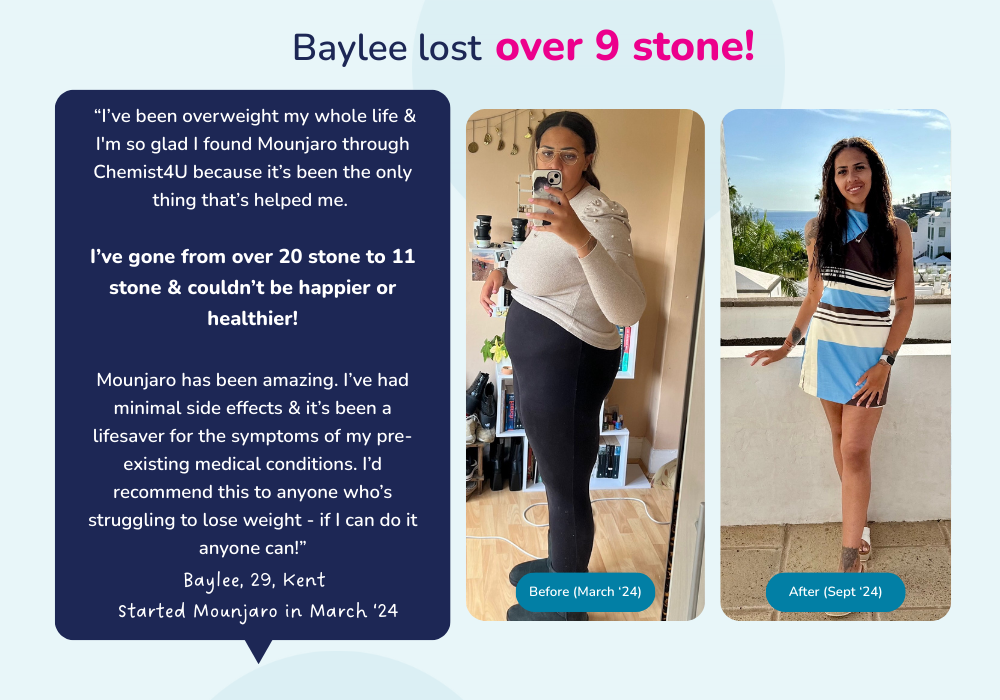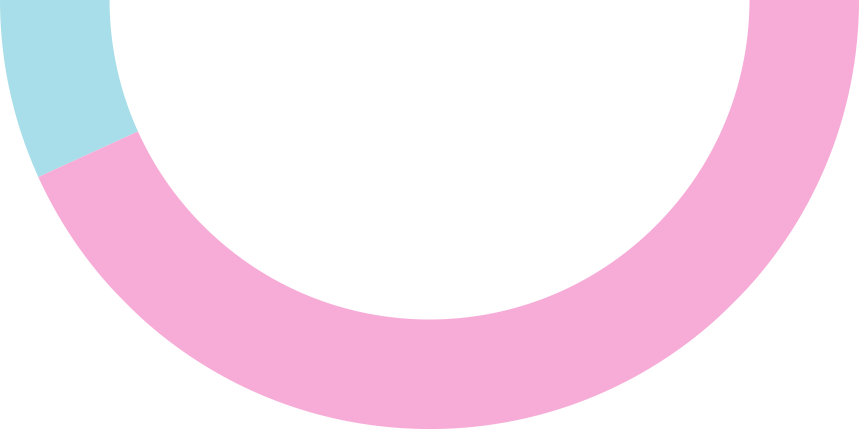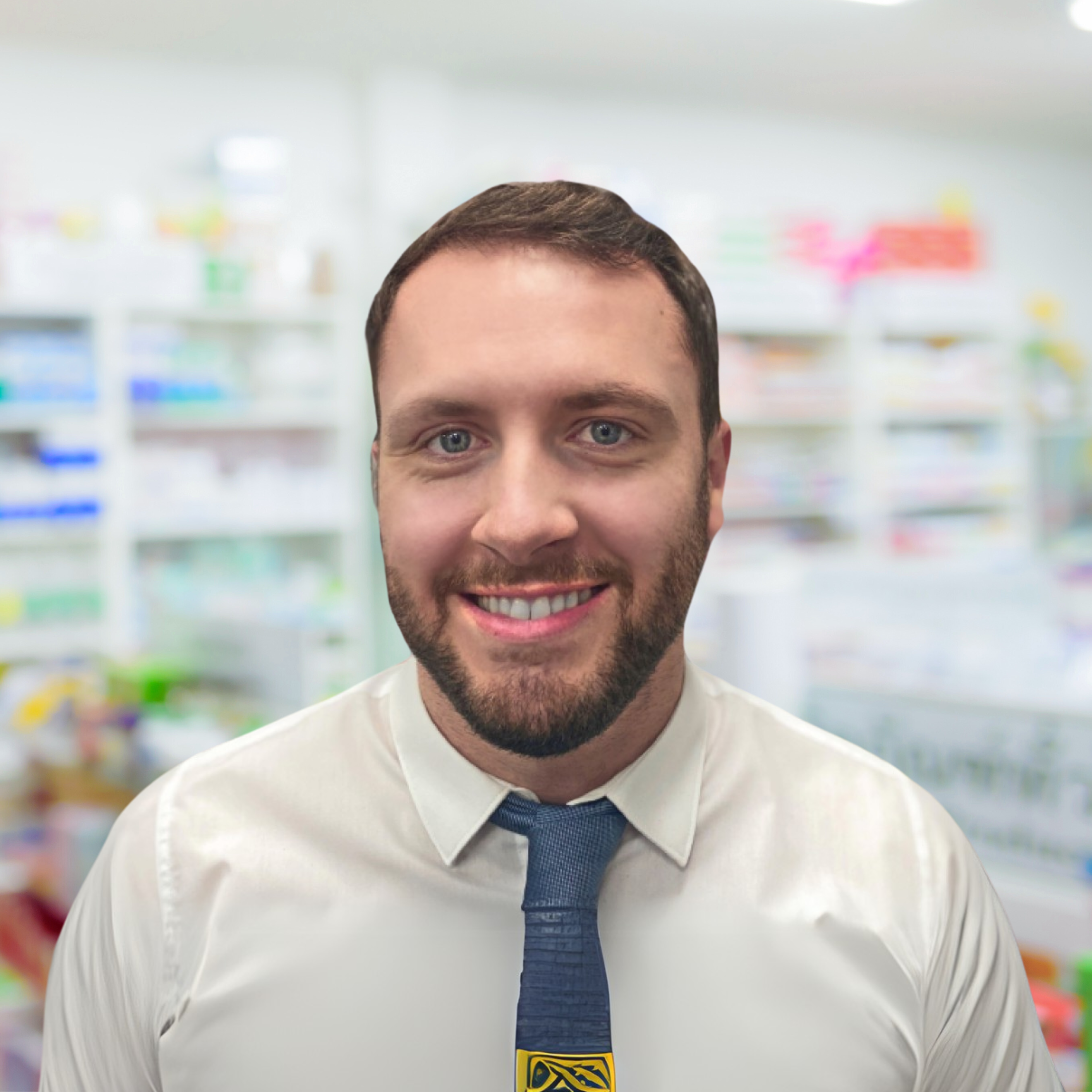- MHRA-approved weight loss injection
- Suitable for adults with a BMI >30 or 27> with a weight-related condition
- Prescription-only weekly injection using the easy-to-use KwikPen
- See how Mounjaro is changing lives with real case studies
- All doses in stock
- Always read the patient information leaflet before use




What is Mounjaro (tirzepatide) and how does it help you lose weight?
Mounjaro is a weekly weight loss injection designed to help adults with obesity lose weight and keep it off. You can buy Mounjaro injections in different strengths, including Mounjaro 2.5mg, 5mg, 7.5mg, 10mg, 12.5mg and 15mg. It contains tirzepatide, which helps to curb appetite, keeps you feeling full longer, reduces cravings and helps with weight loss by limiting how much you eat. Each Mounjaro pen contains four doses, enough for one injection per week. This means you’ll need one pen per month to stay on track with your weight loss treatment.
Mounjaro is a weekly injection designed to support weight loss by mimicking the hormones that already exist in your body, GIP and GLP-1, which help control appetite and blood sugar levels.
By mimicking the action of both of these hormones, it helps you feel fuller for longer, reduces hunger, and slows down how quickly food leaves your stomach, so you naturally eat less and find it easier to lose weight.
Clinical studies show it can lead to more significant weight loss than similar medications, especially when combined with healthy eating and exercise.
One important thing to note: because Mounjaro affects how your body absorbs oral contraceptive pills, they may be less effective when you start or increase your dose.
If you’re taking the pill, use extra protection, like condoms, for four weeks after any changes, or consider a non-oral contraceptive for peace of mind.
What results can I expect?
If you use Mounjaro for weight loss, you could lose up to 21% of your body weight after about 9 months. People who continued taking it for nearly two years lost around 25%[1] of their starting weight.
This means you could lose up to a quarter of your body weight and keep it off, which is far more than what’s typically possible with diet and exercise alone.
See how people just like you have achieved amazing results!

Follow Baylee's weight loss journey - @baylsse
Why am I not losing weight on Mounjaro?
If you’re not seeing the scales move while using Mounjaro, it doesn’t necessarily mean you’re not making progress.
Research[2] shows that it can lead to greater losses in waist size compared to other medications like Wegovy. Losing centimetres around your waist is a positive sign, as abdominal fat is closely linked to long-term health risks such as heart disease.
Sometimes, people gain muscle—especially if they’re eating more protein or becoming more active—which can balance out fat loss on the scales.
That’s why it’s helpful to measure your waist and notice how your clothes fit, rather than relying on weight alone. Even if your weight stays the same, a shrinking waistline means you’re losing harmful fat.
However, if you’re on a lower dose (like 2.5mg) and are not seeing much progress, you may need a higher dose to help with weight loss. The starting dose is just to help your body get used to the medicine, with more significant changes usually happening at higher doses.
If you’re worried about not losing weight, speak to your prescriber; they can review your treatment and advise if a dose increase is right for you.
Mounjaro vs Wegovy: Which is more effective for weight loss?
| Mounjaro (tirzepatide) | Wegovy (semaglutide) | |
|---|---|---|
| Active ingredient | Tirzepatide (dual agonist of GLP-1 and GIP receptors) | Semaglutide (GLP-1 receptor agonist only) |
| Mechanism of action | Mimics GLP-1 and GIP hormones to reduce appetite and slow stomach emptying | Mimics GLP-1 hormone to reduce appetite and slow stomach emptying |
| Dosage strengths | 2.5mg, 5mg, 7.5mg, 10mg, 12.5mg, 15mg (weekly injection) | 0.25mg, 0.5mg, 1mg, 1.7mg, 2.4mg (weekly injection) |
| Starting dose | 2.5mg weekly | 0.25mg weekly |
| Maintenance doses | Whatever dose is effective at maintaining weight. Manufacturer recommends 5mg, 10mg, or 15mg weekly | Whatever dose is effective at maintaining weight. Manufacturer recommends 2.4mg weekly |
| Average weight loss | Up to 25% weight loss in 88 weeks | Up to 15% - 17% weight loss in 68 weeks |
| Common side effects | Nausea, vomiting, diarrhoea, constipation, indigestion | Similar to Mounjaro |
| Serious side effects | Pancreatitis, gallbladder issues, gastroparesis, hypoglycemia (with certain meds), kidney injury, allergic reactions | Similar to Mounjaro |
| Cost per 4-week pen | £129–£245 depending on dose | £118–£295 depending on dose |
| Manufacturer | Eli Lilly | Novo Nordisk |
| Approval | MHRA-approved for weight loss and type 2 diabetes | MHRA-approved for weight loss and type 2 diabetes |
| Injection frequency | Once weekly | Once weekly |
| Switching between drugs | Limited safety data on switching. We advise to wait at least 5 weeks after last dose of Wegovy before starting Mounjaro | Limited safety data on switching. We advise to wait at least 4 weeks after last dose of Mounjaro before starting Wegovy |
When comparing weight loss results, Mounjaro stands out for its effectiveness. People using the injection can lose around 20% of their starting body weight after about nine months, with one trial showing a mean of 25% of initial body weight lost after 88 weeks of continued use[1].
Who can use it?
- Mounjaro is intended for adults (18+) who need help losing weight
- Suitable if BMI is 30 or above, or 27 and above with weight-related conditions (e.g. high blood pressure, high cholesterol, prediabetes, heart problems)
- Should only be considered after attempting weight loss through diet and exercise
- Can be prescribed to older adults, including those in their 60s and 70s, if safe for their health needs
- Extra caution is required for people over 75, due to increased risk of side effects such as nausea, dehydration or kidney strain. We do not prescribe to patients over 75 years old from our clinic
You’ll need to complete an online consultation with one of our UK prescribers.
How to use
Always use your injection exactly as described in the patient information leaflet or as your doctor/Chemist4U pharmacist has told you.
Follow these instructions on how to inject:
- Choose your injection site, either your stomach (at least 5cm away from your belly button), thigh, or the back of your upper arm (if someone helps you). Rotate the injection site each time
- Wash your hands
- Attach a new needle
- Prime the pen
- Turn the dose knob until the ‘1’ appears
- Insert the needle under the skin
- Press the dose knob until it stops
- Count to five before removing the needle
- Dispose of the needle safely in a sharps bin
- Replace the pen cap
For detailed instructions on how to use your pen, including how to dispose of an empty pen and needles, please read our ‘How to take Mounjaro’ guide.
What are the doses?
| Week range | Dose | Purpose |
|---|---|---|
| 1-4 | 2.5mg | Starter dose. You always start on the lowest dose to reduce side effects |
| 5-8 | 5mg | Dose increased after a month to prevent weight loss slowing down. 5mg can also be used as a maintenance dose |
| 9+ | 7.5mg, 10mg, 12.5mg, 15mg | After two months, your dose may be increased further to help you continue losing weight. Any of these doses can be used as a maintenance dose; the highest dose is not always necessary for effective weight loss |
Everyone starts on the 2.5mg dose, regardless of previous experience with weight loss injections. Each pen contains four doses, designed for one injection per week, making it easy to stay on track with your treatment.
After the initial four weeks on 2.5mg, your dose may be gradually increased in 2.5mg steps, following a schedule set by your prescriber.
Mounjaro's maintenance doses vary between 5mg and 15mg, and the maximum dose is not always needed for it to work effectively.
When can I go up a dose?
You can increase your dose every four weeks, but only if advised by your prescriber. This gradual approach, known as titration, allows your body to adjust to the medication and helps minimise side effects.
You may need to increase your dose after starting on 2.5mg because your body can get used to the medication, which might make it less effective over time. This can also happen at higher doses, so your prescriber might suggest moving up to the next level to keep your weight loss on track.
However, you may need to stay on a lower dose for longer if you experience side effects or if you’re satisfied with your weight loss at that dose.
Never increase your dose more frequently than every four weeks, as this can increase the risk of side effects and may even compromise your health.
If you notice your weight loss has plateaued, or if you’re experiencing increased hunger or cravings despite sticking to your plan, discuss with your pharmacist whether moving up to the next dose is right for you.
The “Mounjaro 5th dose” or “golden dose”
The "5th dose" or "golden dose" refers to a self-added dose to the pen's standard four doses.
It's believed that this extra amount of liquid is added to ensure there is sufficient excess fluid to prime the pen. The extra liquid is not a measured or intended dose, and its volume may be inconsistent, which can lead to underdosing or overdosing and even the risk of injecting expired medication.
Trying to extract a fifth dose can also damage the pen, increase the risk of side effects, and disrupt your treatment plan. For your safety and the effectiveness of your treatment, always use your pen exactly as prescribed and discard the pen after four doses, even if some liquid remains.
Dialling lower doses or extending the gap between injections
We are aware of the practice of dialling lower doses on weight management injections or regularly extending the injection gap beyond every 7 days.
We do not recommend anyone does this or offer advice regarding this practice. We can only advise that Mounjaro and Wegovy are used according to the instructions provided.
Please be aware that this does not necessarily produce an accurate dose, and dialling lower doses to extend the usage time of a pen could mean that you are injecting expired medication towards the end of the pen's use.
This creates an apparent treatment gap when you come to reorder your next pen, as there is a longer time between ordering.
Our prescribers may need to put your order on hold to ask further questions or may even decline the next order and recommend a lower dose, because of safety issues with long gaps in treatment.
Side effects
Like all medicines, Mounjaro may cause side effects in some people, but these won’t affect everybody. Common side effects may include:
- Nausea & vomiting
- Stomach (abdominal) pain
- Diarrhoea & constipation
For more information on side effects, including potentially serious side effects, refer to the patient information leaflet or read our in-depth ‘Mounjaro side effects’ guide for helpful advice.
Who can’t use it?
- Do not use if you’re allergic to tirzepatide or any of the other listed ingredients
- Only suitable for adults aged 18 years and over
- Do not use if you are pregnant or breastfeeding. Contraception is recommended while using Mounjaro
- Inform your prescriber if you’re taking any other medication
Is it safe?
Mounjaro has a good safety profile when prescribed by a regulated prescriber and is used as directed. It has been licensed after completing rigorous clinical trials and has been approved by the Medicines and Healthcare Products Regulatory Agency (MHRA)[3].
Mounjaro with food, drink & alcohol
Weight loss injections can be used before or after a meal; this will not impact its effectiveness.
When using, it’s best to avoid foods high in saturated and trans fats (like fatty meats, fried foods, butter and full-fat dairy), added sugars (such as sweets, cakes and fizzy drinks), and highly processed foods, as these can worsen side effects and reduce the medication’s effectiveness.
Greasy, spicy or very sweet foods may also make digestive side effects like nausea or diarrhoea worse.
With alcohol, it’s advised to limit or avoid it, since it can increase side effects like nausea and may reduce how well it works; alcohol is also high in calories and can slow your weight loss progress.
For more information on what you can and can’t eat while on your treatment, read our ‘Mounjaro diet’ guide, which also includes advice about drinking fizzy drinks and alcohol during your treatment.
How to store
A new, unused pen should be kept in the fridge between 2°C and 8°C in its original packaging. Once you have started your pen, it may be stored at room temperature, as long as this does not exceed 30°C. A started pen must be used within 30 days.
Unsure how to store your pen after use or while travelling? Our guide on ‘Storage safety for weight loss injections’ covers everything you need to know about keeping your weight loss pen safe and effective.
Start your Mounjaro consultation
Sources
- 1. Aronne, L. J., Sattar, N., Horn, D. B., et al. (2024). Continued Treatment With Tirzepatide for Maintenance of Weight Reduction in Adults With Obesity: The SURMOUNT-4 Randomized Clinical Trial. JAMA, 331(1), 38–48. https://jamanetwork.com/journals/jama/fullarticle/2812936
- 2. Jastreboff AM, Aronne LJ, Ahmad NN, et al. Tirzepatide Once Weekly for the Treatment of Obesity. N Engl J Med [Internet] 2024 [cited 2025 May 28];390(22):2050-2062. Available from: https://www.nejm.org/doi/full/10.1056/NEJMoa2416394
- 3. Medicines and Healthcare products Regulatory Agency. (2023). MHRA authorises diabetes drug Mounjaro (tirzepatide) for weight management and weight loss. GOV.UK. https://www.gov.uk/government/news/mhra-authorises-diabetes-drug-mounjaro-tirzepatide-for-weight-management-and-weight-loss
Find similar products
Mounjaro Injections Reviews
Advice & Guides
Mounjaro diet: what to eat and what to avoid
How often to use Mounjaro and when to increase your dose
Obesity & Weight Loss - Symptoms, Causes & Treatment
Funding your weight loss treatment
How to stay motivated during your weight loss journey
Is tirzepatide approved for weight loss in the UK?
Keeping your Wegovy or Mounjaro pen refrigerated - storage safety
The Mounjaro dosing schedule and titration calendar
Can you get Mounjaro on the NHS?
The National Institute for Health and Care Excellence (NICE) approved Mounjaro in October 2023 as a treatment for type 2 diabetes and for weight loss in January 2024.
The NHS now offers it to adults with a BMI of 35+ and at least one weight-related health condition.
Current access:
- Since March 2025: Through specialist NHS weight management clinics (GP referral required)
- From June 2025: Directly from GPs for high-risk patients meeting strict criteria
What needle size do I need for Mounjaro?
The Mounjaro KwikPen works with ISO 11608-2 compliant pen needles from brands like BD, Novo Nordisk and Terumo. Your needle length and gauges need to be any of the following combinations:
- Lengths: 4 mm, 5 mm, 6 mm, 8 mm, 12.7 mm
- Gauges: 29G, 31G, 32G, 33G, 34G
Where can I buy Mounjaro?
You can purchase Mounjaro from Chemist4U after completing a quick consultation. During this process, you’ll answer a few simple health questions and upload a photo of yourself to support your answers.
If you’re suitable for treatment, you’ll start on the lowest dose of 2.5mg. Your dose will gradually increase if you and your prescriber find it effective and you’re tolerating it well.
Is it better to buy a Mounjaro weight loss bundle?
Not always, as it depends on what is right for you and your lifestyle.
However, choosing a bundle is a more affordable option and minimises the number of consultations required. If you’re unsure which bundle is right for you, always speak to your prescriber for advice.
For more information about Mounjaro bundles, click the highlighted link.
















